Introduction by Jess Ponting
I’ve found my journey to full-time surf researcher and surf park enthusiast pretty entertaining along the way. Everyone I’ve talked to in the surf park space has a unique backstory combined with a predilection for adventure that at least partially accounts for their willingness to take a pioneering role in an emerging high-tech, engineering heavy, capital intensive industry based on a thousands of years old indigenous sport traditionally practiced in nature, naked, on a plank of wood. In this piece we’ll hear about a singular, brutal journey to surf park advocacy from someone whose trajectory has intersected with mine. Twice. Twenty-five years apart.
In 1999, over three grueling days, I flew from Sydney to Medan, Sumatra, then took an overnight bus across Sumatra to Sibolga, a ferry to Gunung Sitoli on Nias, a bus across Nias to Lagundri Bay, and a panga out to the Hinako Islands. I was chasing what felt like a once in lifetime opportunity to link up with a surf exploration mission onboard a 128-foot ironwood phinisi ketch, newly built in the traditional way on Sulawesi. With 12 rustic cabins, the Indies Explorer was a boat conceived by a collective of South Africans who pitched in to build a vessel for surf exploration across the Indian Ocean with the goal of eventually arriving back in South Africa.
The Indies Explorer
A housemate of mine was dating one of the partners in the project. He had fallen out with the organizers and encouraged me to track down the boat, which was apparently fairly likely to be somewhere around the Hinako islands but no guarantees, and take his spot onboard. I eventually found it anchored off the island of Bawa, paddled out across the fringing reef, climbed up the ladder and into a job as a deckhand. High adventure followed and included enormous manta rays, whale sharks, malaria, a typhoon in the heavily pirated Straights of Malacca, a near miss with a container ship, synchronized bilge pump failures, 2 am squalls and slipped anchors, government extortion, absurdly beautiful islands, stunning sunsets, and incredible, completely empty reef breaks.
But this story isn’t about me. It’s about someone else who worked on the Indies Explorer after it had become part of the live-aboard surf charter fleet in the Mentawai Islands, 130 nautical miles off the central west coast of Sumatra. Jo Mooland was a tall, athletic, young woman from England. A bawdy, practical joker, life of the party type with a wicked sense of humor and infectious laugh, Jo worked as the ship’s cook and surfed between meal preparations. She was dating one of the partners who I had become friends with during my time onboard several years earlier (shout out Lombard). She ended up in Sydney and we met through mutual friends and surfed and hung out, became friends, and she headed up for an extended stay in Byron Bay.
We kept in touch, and eventually, social media became a thing, and I tracked her surfing adventures vicariously. There were many. She was completely unafraid to live the dream and it was inspiring. Then things took an unexpected turn. I’m going to get out of the way and let my friend Jo tell you about her remarkable personal journey back to surfing.
Jess Ponting
________________________________________________________________________-
By Jo Mooland
Have you ever been out of the water with an illness or injury and suffered all kinds of torment because you couldn’t get your surf fix? Can you imagine what it would be like to lose the ability to walk across sand, or use your arms to wash your hair? Would you be satisfied to watch others ride waves if you could no longer manage it yourself? Would the community of surfers you have always felt part of still be your people? Would you still have a reason to get out of bed in the morning?
During my 25 plus years of surf travel, these questions rarely crossed my mind. Like many other surfers, I had injuries that kept me out of the water temporarily. Even major spinal surgery didn’t stop me surfing. The rehab took time but I got there. At 44, I was a middle aged woman surfing Morocco’s Anchor Point with men half my age and I thought things had already been as bad as they were going to get. I’d been airlifted from my home in Bali to Raffles hospital in Singapore when I could no longer walk because of back issues. I’d spent a week on a drip in Denpasar with my third round of Dengue fever. It turned out things can get much worse. And they don’t always get better.
I returned to live in the UK late in 2011 and for a few years, kept getting really heavy colds and what seemed like flu. This often happened after a surf trip or a good night out. The kind of viral symptoms that put me in bed for a week at a time and left me drained for a month after. I kept randomly waking up at night in a fevered sweat. After a tiring day of teaching it seemed like my eyeballs were trying to escape their sockets. Repeated trips to the GP and a whole raft of “normal” blood tests got me nowhere. Then I chanced upon a leaflet in a waiting room and the virtually unpronounceable name of what I had been experiencing. Myalgic Encephalomyelitis. Otherwise known as Chronic Fatigue Syndrome. I dislike the term CFS because it sounds like sufferers are just really tired all the time. That would be heavenly compared to the constant extreme sensory sensitivity, severe pain, bedridden reality of many at the severe end. Others are intubated, living like prisoners in a dark cell or languishing in mental hospitals. Treated like the hysterical women of 18th century horror stories. I would call my experience “extreme exertion intolerance.” Imagine staying up three nights in a row partying then doing a marathon having had nothing to eat or drink the day before. That’s an average symptom day for a person with ‘moderate’ M.E. Out of necessity, I spend most of my time lying down in silence, doing nothing but breathing.
Official diagnosis by a Rheumatologist in 2015 was of little use. There is no medical treatment for a complex neuro-immune disease that affects every body system. There’s not even a diagnostic test. I was given advice about pacing and graded exercise therapy, however, GET is now known to be harmful and no longer advised by the National Institute for Health and Care Excellence. I assumed that if I followed the advice, ate well and exercised, I’d get better. I never imagined that I could get worse, that M.E., a disease of unknown cause or origin could progress with each and every infection or major stress. That exercise, far from helping, would in fact make me more sick, or that I’d reach a point when I would struggle to speak, eat or walk, let alone surf. That I only have a 5% chance of recovery, and since that rarely occurs beyond the first couple of years, well, frankly I’m fucked unless a medical treatment becomes available in my lifetime. The prognosis for a woman of my age, who has been this ill for this long is poor. Each time I have a dengue fever reactivation or I do a little bit too much activity (including seemingly innocuous things like a phone call) I run the risk of becoming permanently even more disabled by my symptoms. I have felt well enough to briefly leave home alone only twice in the last year.
Surfing was over for me. Work became impossible too. I’d previously lived aboard the surf charter boat ‘Indies Explorer’ in the Mentawais, spent more than a decade surf adventuring in the tropics, and had built my whole life around surfing. I now found it painful to even think about surfing let alone watch others enjoying it. Then, some time in 2021, I saw on the local news that Mark Hagger, a friend from way back who now has Multiple Sclerosis, had become the Prone assist, English Adaptive Surfing Champ. He was getting pushed into waves by someone else! He was competing at The Wave in Bristol, a surf park where access for people with impaired mobility had been a central design consideration. At last, HOPE! But how?
At that time I was spending most of my time in bed. I could barely tolerate a 15 minute car journey. A short wheelchair ride (someone else pushing me) to my local beach would completely wipe me out. I needed a suitable vehicle to have complete rest in before and after surf sessions, an electric wheelchair, a mobility aid that could get me across sand, people willing and able to do everything for me that I couldn’t do for myself. I needed to be well enough to even try getting into a wetsuit, let alone lying on a board. My batteries were always on empty. I had to re-learn everything involved with surfing using minimal energy so I could manage it without dry heaving, heart palpitations or migraines. I needed to apply for funding with a brain that no longer functioned properly.
I thought I knew patience. I thought I knew determination. I thought I’d demonstrated a tenacious spirit when in spinal fusion rehab. I knew nothing. The barriers to adaptive surfing are many and the walls to climb are high. Getting in a wetsuit designed for an able body is just one of them. Despite the challenges, surfing in the Welsh Para Surfing Championships at The Wave, Bristol finally brought my mojo back. It has helped me physically and mentally. I now feel motivated to keep forcing myself out of bed each day despite the pain and stiffness to make improvement in tiny increments, and to very carefully keep my body moving.
A wave park comp felt manageable for my first time because of all the safety measures and that I could rest as much as I needed to, very close to my adapted vehicle. I can watch other competitors and learn from them as well as cheer them on from the pier when they are heading back to the lineup – having this encouragement myself when I was so exhausted and in agony helped me keep going.
Now a few months later, here I am. Age 53 with two shiny new bronze medals from my first two adaptive competitions and a goal of joining the 2024 pro adaptive tour; because that is the way to get the word out to anyone who will listen that surfing is for EVERYBODY!
At the moment the amount of surf camps, surf resorts and surf schools offering adaptive surfing is extremely limited. When I make enquiries I am generally either met with silence or lame apologies, but no effort to improve access. As I write, plans to build an accessible surf park in Dorset, using Wavegarden technology, have been held up for two years by official objections despite strong community support. I’m actively participating with a grassroots movement of Dorset locals pushing for this park to open and be a hub for people with disabilities to get inspired and get active. Our facebook group “Support Dorset’s Surf Lagoon” has almost 600 members and a Change.org petition in favor of the Brock’s Pine surf park gathered almost 2500 signatures.
I’ve got this disease for a reason. It’s to advocate for beach, sea, and surfing access for all. To inspire others to find the strength to keep waking up in the morning. I believe in blue water therapy for everyone, not just those who can easily get it.
I am now on a mission to find sponsorship and funding for functional therapy and appropriate training, a custom board, international travel to comps, and a mobility aid that can get me across sand without causing more pain. I have yet to be officially classified by the International Surfing Association for para surfing because my disability, despite its severity, does not neatly fit one of the ten International Paralympic Committee categories. This means I was excluded, as were many others, from representing England at November’s World Para Surfing Championships and any benefits that being on the national team may bring. The barriers to classification by official para surfing represent yet more obstacles to overcome. On average it takes my body two weeks to recover from the exertion of a prone surf session. Often longer. In many ways the biggest battle has only just begun. Life was easier but far less meaningful when I had nothing to aim for apart from getting through the day without collapsing or injuring myself.
Find me on Instagram: @jojosmojoco, @jojoshealingheartsco and @joanne.mouland.art
Facebook: Jo Mouland





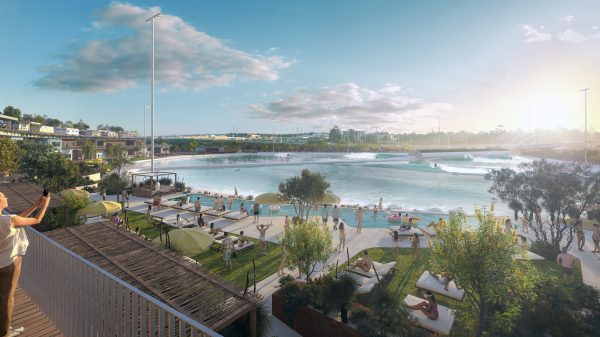
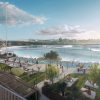


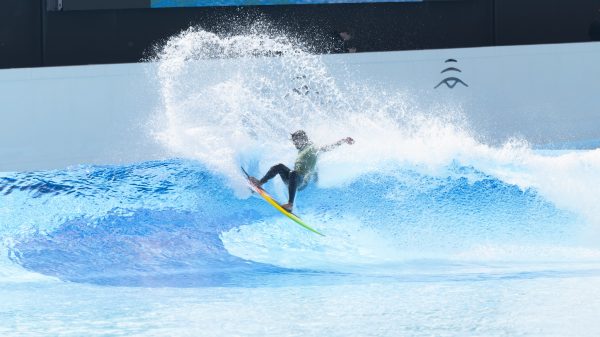
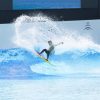
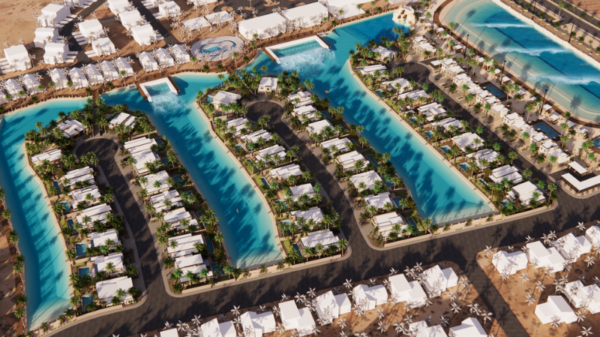

You must be logged in to post a comment Login